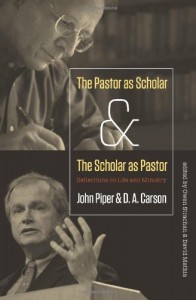 The blend of a pastor and a scholar is a helpful one for the church. Though the average churchgoer may not immediately sense it, a Scripturally deeper pastor makes for a more Scripturally robust people. The blend of a scholar and a pastor is equally helpful. Those of us who have been to seminary know the personal value of having shepherd-hearted scholars who sharpened us while grilling us in the details of grammar and plunging us into reams of reading. While many church-goers may not know it, such scholars have blessed their congregations as well as their pastors.
The blend of a pastor and a scholar is a helpful one for the church. Though the average churchgoer may not immediately sense it, a Scripturally deeper pastor makes for a more Scripturally robust people. The blend of a scholar and a pastor is equally helpful. Those of us who have been to seminary know the personal value of having shepherd-hearted scholars who sharpened us while grilling us in the details of grammar and plunging us into reams of reading. While many church-goers may not know it, such scholars have blessed their congregations as well as their pastors.
John Piper and D. A. Carson may be two of the best modern examples of pastor-scholars and scholar-pastors. The book they have produced, The Pastor as Scholar and The Scholar as Pastor is an encouraging biographical exhortation from these two men as to how ministry and scholarship have been blended in their respective ministries. Pastors and church members would do well to read this short volume.
The contents of the book were first produced as lectures at an event sponsored by The Gospel Coalition. Owen Strachan and David Mathis contribute an introduction and conclusion respectively, and were instrumental in the event that was the genesis for the book. The book contains primarily biographical descriptions from Piper and Carson on the providential work of God to challenge them in terms of academic excellence and pastoral practicalities.
Piper’s chapter on “The Pastor as Scholar,” biographically chronicles his own pilgrimage from childhood to doctoral studies in Germany, to pastoral ministry in Minneapolis. The chapter demonstrates the potential pitfalls of what some pursue as academic scholarship (i.e., reading much necessarily leads to excellent scholarship, pp 38, 39), and urges a “link between Christ-exalting joy and scholarly effort (49-50). “Right thinking about God exists to serve right feelings for God” (50). Piper gives brief reviews through 2 Timothy 2:7, Acts 17, Luke 12, Matthew 21:23-27 and a number of other passages to show the need for sharp thinking that leads to pastoral effectiveness. He urges a kind of rigorous reading that seeks not merely to make it through volumes of material, but argue diligently with the best material to sharpen one’s thinking on the Bible.
Carson, as Piper, chronicles his own pilgrimage into biblical scholarship (through the home of an ordinary pastor). He aptly warns us not to make a strong dividing line between the heart and the head – the Bible does not make such a distinction (74-77). Carson then ends his chapter with a number of lessons for the scholar as pastor. He warns of the seduction of applause from the academic community (which can drive a man’s approach to Scripture). He cautions scholars to not make a major disjunction between reading Scripture critically and devotionally (90, 91). One the most helpful notes for me was on the subject of reading. Carson writes
One of the things that thoughtful scholar-pastors will do is preserve time for reflective reading of the best books.
But he also encourages,
If you can develop the habit of reading different things at different speeds, you might be wise to read some books slowly, evaluatively, and often; to read some books briskly, once but comprehensively; to skim other books to see what they are saying; to dip into still other books to see if they add anything to a discussion or merely say the same old things with a minor twist here and there (97).
This is different advice than Piper gives (and I think a bit better). Piper encourages pastors not to be given to quickly reading through as much as possible without thoughtful argument and evaluation (good). Carson doesn’t argue against this. He simply encourages that in reading through a large volume of material, some of it you need to simply make yourself aware of, while other material you need to read more reflectively (better).
The book is short and helpful to stimulate a pastor’s heart to think more biblically about the blend between pastoral ministry and scholarship. I pray that this ordinary pastor will apply it to the benefit of God’s people that results in God’s glory.







Good summary, Bret. I’ll have to pick up a copy. By the way, I just got an iPad, and I’m loving it. The iPhone is next, and then hopefully a MacBook Pro. You were right. I never should have waited this long! Blessings, brother.
Hey Tim! You are a great example of what Piper and Carson are advocating in the book. You’ll find the book an encouraging read.
Get that Mac soon. We’ll probably see a new iPhone this fall and the MacBooks are due for a refresh soon. Can’t wait to hear how you begin using your iPad in preaching, teaching, etc.